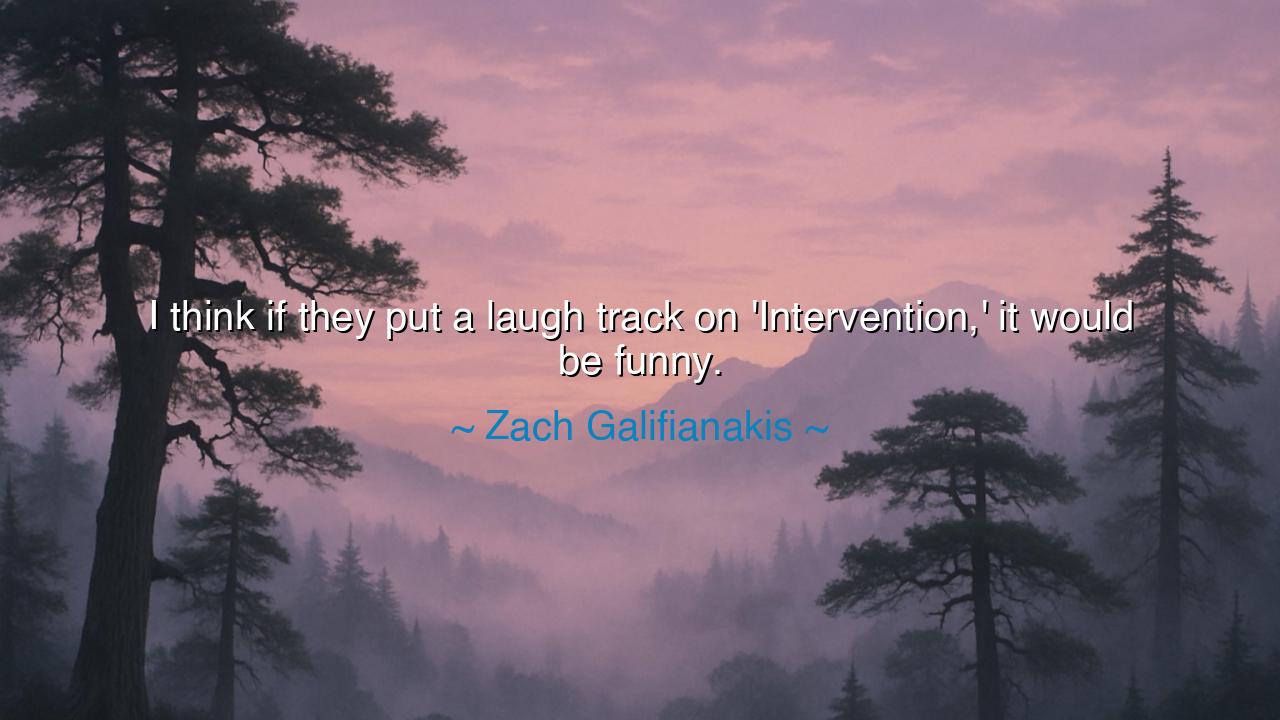
I think if they put a laugh track on 'Intervention,' it would be






The words of Zach Galifianakis, “I think if they put a laugh track on ‘Intervention,’ it would be funny,” seem light as air, yet within them lies the weight of our age — an age that confuses laughter with understanding, mockery with mercy. To the unseeing ear, it is but a jest; to the soul that listens deeply, it is a lament for the way humanity drapes comedy upon tragedy and makes a spectacle of suffering. Like the poets of old who spoke truth beneath riddles, Galifianakis offers a mirror—one that reflects both the cruelty and absurdity of modern entertainment.
In ancient times, laughter was sacred. It was the sound of gods mocking fate, the balm that soothed warriors after battle. But now, laughter has been harnessed by the marketplace. It is canned, cued, and timed—not born of heart, but manufactured by demand. The “laugh track” becomes a symbol of this artifice, a mechanism that teaches us when to find joy, even when joy is absent. And so, if such laughter were placed upon a show like Intervention—a series about people in the depths of addiction—it would expose the dissonance of our hearts. For we have grown numb to pain unless it is wrapped in irony.
Consider the story of the Roman emperor Nero, who played his lyre while Rome burned. To some, his music was madness; to others, it was indifference made art. What is the modern equivalent, if not our laughter at despair broadcast through glowing screens? The laugh track, in this light, becomes a modern lyre—its notes soothing our conscience while the world burns behind the rhythm of applause. Galifianakis, through humor, calls us to see the tragic absurdity of such detachment.
Yet this quote is not condemnation alone—it is a call to awakening. For in realizing the absurd, we reclaim our empathy. The ancients taught that wisdom begins with seeing folly. Just as the philosopher Diogenes walked with a lantern at noon, seeking an honest man, so too must we walk through the noise of false laughter, seeking sincerity. When we feel the impulse to laugh at another’s ruin, we must ask: is this laughter born of the spirit or of the crowd? To know the difference is the beginning of compassion.
The emotional power of the quote lies in its paradox. Humor and sorrow are not enemies—they are kin. Both spring from the recognition of our human frailty. In every true comedian there is a philosopher, and in every philosopher a hidden clown. To place a laugh track over human suffering is to misunderstand the sacred dance between tragedy and comedy. The wise do not mock pain—they transform it. They take the tears of life and shape them into something that heals, not harms.
Let us remember also the story of Charlie Chaplin, who made the world laugh during its darkest hours. In The Great Dictator, he mocked tyranny not to belittle suffering but to awaken conscience. His laughter was not cruel—it was compassion disguised as comedy. Galifianakis’s words invite us to discern such laughter again, to see that even humor can become holy when wielded with understanding. The world does not need more amusement; it needs more awareness wrapped in joy.
Therefore, the lesson is this: laugh, but let your laughter be wise. Watch, but let your watching be awake. Do not allow the laugh track of the world—its noise, its irony, its easy detachment—to drown the music of your heart. Instead, cultivate the laughter that springs from truth, that heals rather than hides. When you witness pain, do not turn it into entertainment; turn it into compassion. When you hear the world laughing at sorrow, dare to be silent—and in that silence, remember your humanity.
So, my child, when next you hear laughter on the wind, ask from where it comes. If it comes from kindness, join it. If it comes from cruelty, stand apart. For the soul that knows when to laugh and when to weep has found balance—and in that balance, wisdom abides.






AAdministratorAdministrator
Welcome, honored guests. Please leave a comment, we will respond soon